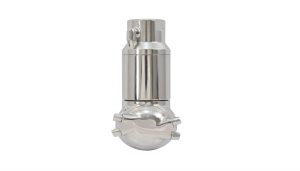The cleaning of tanks that contained flammable materials, however seemingly innocuous, can be hazardous. A tank emptied of such products can still contain trace vapours or dust which is often explosive. Indeed, an empty or part-filled tank normally represents a greater explosion risk than a full one. In these cases, it is essential to ensure any cleaning in place (CIP) system is certified as safe to work in explosive environments.
Case Study - flammable detergent residue
One of the UK’s leading household products manufacturers was looking for a solution to clean a number of powdered detergent processing tanks as well as tanks used for storage of the product. The light residue left by the powder became sticky when in contact with the cleaning fluid so a medium impact cleaning solution was needed. The client was also looking to achieve a faster cycle time and a reduction in fluid consumption.
All of the tanks were relatively small at 2 x 2 m and there was 6 bar pressure available. The processing tanks had mixing paddles in the middle. The client had previously ordered Orbitor Eco machines and was very pleased with their performance. However, due to the potentially flammable nature of the dusty residue left by the detergent powder, an ATEX-certified cleaning system was necessary. While fluid driven rotary cleaners do not have any electrical components, they must still have an ATEX approval that corresponds to the class of environment they are to be used in (typically closed environments like tanks will be zone class 0) when being used where there is an explosion risk, in this case because of flammable dust. This is because of the potential, however unlikely, for the moving parts of the cleaning machines to create a spark or discharge which could act to ignite the dust.
 Due to the very fast spin speed of the Eco model’s gears, these machines cannot be ATEX certified. The Orbitor Compact model of rotary jet cleaner was therefore proposed as this could be supplied in an ATEX-certified version: the complexity of the Orbitor machine, when compared to simple rotary fan nozzles, means that some design modifications are made to ensure ATEX compliance.
Due to the very fast spin speed of the Eco model’s gears, these machines cannot be ATEX certified. The Orbitor Compact model of rotary jet cleaner was therefore proposed as this could be supplied in an ATEX-certified version: the complexity of the Orbitor machine, when compared to simple rotary fan nozzles, means that some design modifications are made to ensure ATEX compliance.
Due to shadowing created by the paddles, two Orbitor Compacts were installed in each of the processing tanks while only one was needed in the storage tanks. The 4 x 3 mm model was recommended. The jet length at 5.6 m was well beyond what was necessary but this machine provided the optimal balance between water consumption and cycle time. While the cycle time was longer than that of the Orbitor Eco, it was still rapid at only 13 minutes. The machine cut water consumption to 834.6 litres of fluid, equivalent to 64.2 litres per minute.
ORBITOR COMPACT ADVANTAGES
• ATEX certified models available for use in all zones and temperatures
• Reduces cycle times
• Self cleaning
• Self lubricating
• Made from 316ss
• Small - can fit through 85mm opening
• Robust and light
• Can be taken apart in 15 minutes with no special tools
For more details about explosion risks from tank cleaning, please read our article here:
For more information on ATEX compliant CIP systems, please contact SNP on 01273 400092.



